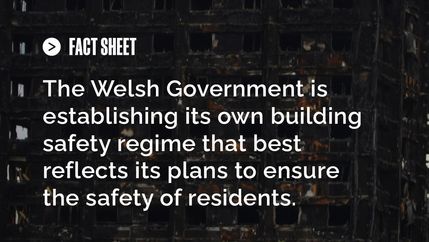
Backed by the principles of safety, accountability, and resident empowerment, the Bill forms part of the Welsh Government’s response to the Grenfell Tower fire. It introduces a new legal role, the Principal Accountable Person, and gives local authorities stronger powers to enforce safety duties.
The new rules focus on improving safety for people living in buildings 11 metres and above (typically five storeys or more). Significantly, smaller buildings and certain Houses in Multiple Occupation (HMOs) are also covered.
Welsh Government unveils landmark building safety reforms
A new Building Safety (Wales) Bill has been introduced in the Senedd that includes wide-ranging reforms to improve the safety of flats and other multi-occupied residential buildings, with guidance expected later this year.
Several issues must be addressed if the legislation is to succeed:
Clarity on responsibilities
In England, confusion about the definition of the Accountable Person (AP) has led to a reduction in compliance, primarily because an AP can’t be identified, or there is disagreement over who is the Principal AP if more than one exists. Property agents are often caught in the middle between freeholders, managing agents, and residents.
Propertymark believes managing agents are best placed to fulfil the duties of an AP as they are often appointed to carry out the existing responsibilities of block owners and support leaseholders.
Clarity on this should be clearly set out in the Bill, with definitions of roles and guidance that explains how agents should meet their duties without duplicating the work of others.
Fact sheet: Building Safety
The Welsh Government has been taking steps to introduce new requirements for buildings at the occupation phase that go significantly further than the Building Safety Act 2022. The proposals extend not only to multi-occupied residential buildings of 18+ metres, but also multi-occupied residential buildings of less than 18 metres (with some exceptions).
Avoiding duplication
Agents who manage residential blocks are already responsible for coordinating compliance with fire safety, asbestos management, gas and electrical safety, and health and safety at work. The Bill introduces new obligations, such as maintaining the golden thread of building information and appointing building safety managers, and the responsibilities of each role must be clearly understood.
Regulatory requirements should be streamlined wherever possible, and clear guidance should be provided on how the new building safety regime will sit alongside existing legislation.
The new Building Safety Regulator must collaborate effectively with local authorities and professional bodies to ensure requirements are consistent and that clear lines of accountability are established so that agents and other stakeholders understand what is expected of them.
Resources for enforcement
Stronger regulation will only deliver real change if it is backed by effective enforcement. Many local authorities in Wales face shortages of environmental health and building control officers, with some councils struggling to recruit and retain skilled staff. Without proper resourcing, there is a danger that new building safety duties will be inconsistently applied across the country, creating uncertainty for landlords, leaseholders, and property agents.
The Welsh Government must commit to dedicated funding and training for enforcement teams, alongside clear national standards for how inspections and investigations should be carried out. Regardless of where they operate, this would help ensure that enforcement is not a postcode lottery and that agents and landlords are treated fairly.
Propertymark has also highlighted the need for ongoing professional development for enforcement officers, so they remain up to date with evolving building safety requirements. Collaboration between the new Building Safety Regulator, local authorities, and professional bodies will be the key to the skills and knowledge needed on the ground.
Impact on costs
We are concerned that additional compliance requirements could increase service charges and deter investment in the property sector, as costs for staff, reports, inspections, data storage and remediation increase.
To mitigate this risk, the Welsh Government should carefully assess the financial impact on landlords, leaseholders, and managing agents, and consider grant support, low-interest loans, or tax reliefs where major works are required.
Furthermore, implementation should be phased, giving the sector time to plan, budget, and build capacity to meet the new requirements.






